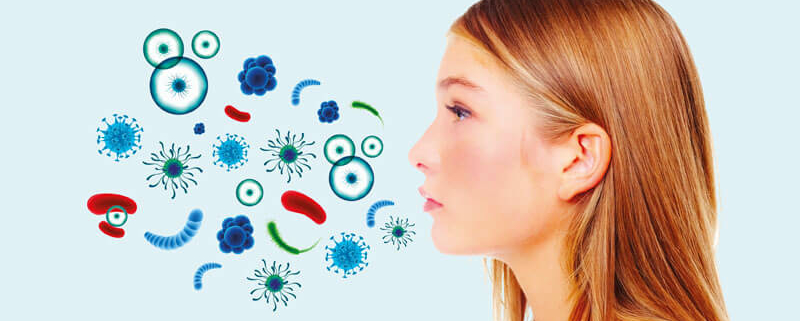Strengthen your defences naturally
Our body has very sophisticated defence mechanisms to protect us against the countless germs we encounter on a daily basis. At all times, our immune system must be ready to fight external aggression. Certain supplements, minerals, plants and vitamins are valuable for organising and supporting our defences.
Lactoferrin
This is a protein that has shaped itself over the course of evolution and natural selection to be a first-line defence in mammals. It can be found in tears, saliva, nasal and bronchial mucus, intestines, blood and, above all, colostrum. Lactoferrin is able to bind iron, preventing the development of bacteria, fungi, parasites, and viruses that require this trace element, particularly intestinal pathogens. Lactoferrin therefore exerts an inhibiting effect on infections by promoting the growth of normal, non-iron-dependent bacterial flora. Lactoferrin thus prevents the colonisation of mucosal surfaces by bacteria, fungi, parasites, and viruses, preventing subsequent penetration into host cells.
Echinacea
This beautiful plant, originally from Canada, helps the system regenerate weakened defences and protect its integrity against attacks from micro-organisms. The extract obtained from the root inhibits the penetration of germs into the cells and hinders their proliferation. In order to fully exploit the properties of the plant, Echinacea purpurea and Echinacea angustifolia, two species whose active ingredients complement and enhance each other, are used in combination.
Fermented papaya
The papaya supplement, made from fresh fruit harvested in selected soils and fermented for a long time (approx. 10 months) at low temperatures with yeast, contains a wide range of components, including vitamins C and E, carotenoids, polyphenols, and oligosaccharides with a potent antioxidant action. This is why papaya is considered the so-called “fruit of long life”.
Zinc
This is the essential trace element for cell growth. It performs a fundamental activity in cellular integrity and immune modulation. Zinc stimulates the immune system through the enzyme alcohol dehydrogenase, which works by preventing germs from multiplying.
Vitamin D
Reduced exposure to sunlight and a lack of vitamin D in food leads to the quite common condition of vitamin D deficiency, potentially responsible for consequences in the bones and other systems, particularly the defence system. Besides being considered essential for intestinal calcium absorption and proper bone mineralisation, vitamin D enhances physiological immune mechanisms.

 Specchiasol
Specchiasol




 Specchiasol
Specchiasol